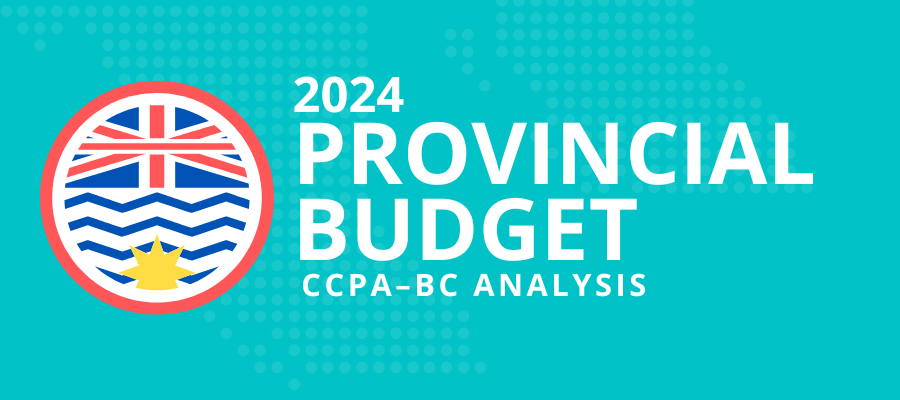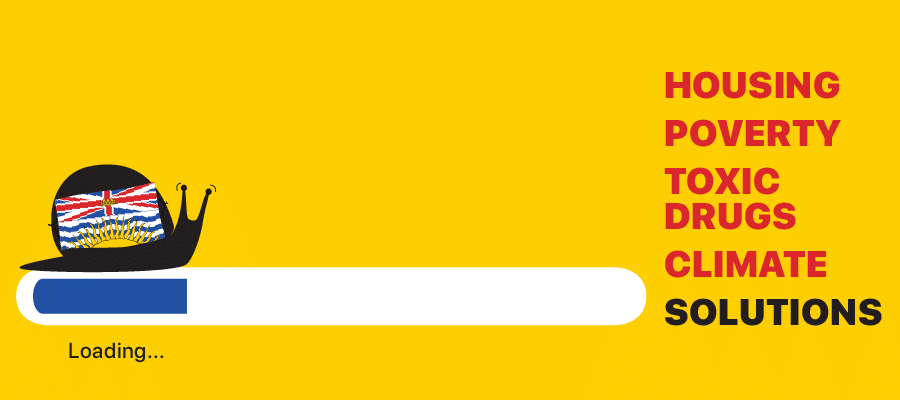BC Budget: Big Challenges—Small Steps

The provincial budget stands up to austerity pressures but falls short on meeting urgent challenges facing the people of BC.
With economic storm clouds on the horizon, BC Budget 2024 does not have one big game-changing new program that stands out, but includes a range of notable investments in a variety of areas including housing, health care and affordability.
Budgets often become stories about deficits or surpluses, though, so let’s start with the big picture in fiscal and economic terms. One thing is clear: this budget rightfully prioritizes public investment over austerity at a time when business lobby groups have been ramping up calls for spending and tax cuts. The budget projects BC’s real GDP growth will drop to 0.8% this year, a slowdown that shapes the fiscal plan significantly.
The government has shown it is willing to table deficits to ensure that badly needed public investments are maintained and increased. Both operating and capital spending will see increases this year and the budget projects a $7.9 billion operating deficit in 2023/24. Projected deficits will fall to $7.7 billion in 2024/25 and $6.3 billion in 2025/26.
At a time when economic growth in BC and Canada is weakening, running deficits to ramp up public investment is well-justified in economic terms. The 2024/25 deficit is about 2% of provincial GDP. Attempting to reduce the deficit arbitrarily would make the underlying economic situation worse, while increasing hardship across BC.
BC Budget 2024 rightfully prioritizes public investment over austerity when business lobby groups are calling for spending and tax cuts.
Caution is also needed in interpreting the headline deficits numbers. In Budget 2024, there are large contingency funds that amount to more than $10 billion cumulatively over the three years of the fiscal plan. Significant portions of these contingencies often go unspent, meaning that by year-end deficits may be much lower than projected (as they have almost every year in BC over decades).
In addition, the government appears to be continuing its trend of lowballing revenues. Combined with the contingencies, this overly prudent approach to budgeting guarantees the government will exceed its targets (i.e., a smaller deficit) by the end of the fiscal year.
Aside from a “home flipping tax” starting in 2025, there are no major new tax revenue measures in Budget 2024, perhaps not surprising in an election year. Rather, there is a business tax cut projected to cost the government $100 million in revenue from the Employer Health Tax (EHT). The government is raising the threshold for this tax from $500,000 of payroll to $1 million and businesses with payrolls between $1 million and $1.5 million will also see a decrease in their EHT.
A hidden $500 million tax cut for BC’s largest industrial polluters also appears due to the April 2024 transition to a new “output-based pricing system.” In this new system for large industry, a portion of emissions—50% in the case of the oil and gas industry—will be exempted from the BC carbon tax.
Why BC should be giving a tax break to the industry causing climate change is a mystery in light of the province’s Clean BC plan and aggressive greenhouse gas reduction targets. This fossil-friendly tax cut means less funding for Clean BC programs to reduce provincial emissions, although the Climate Action Tax Credit will be increased to offset impacts for low- to middle-income households.
An eventual reduction in deficits and increased funding for public services should come from increased taxes focused on corporations and the wealthy.
Indeed, emissions in BC are set to jump when LNG Canada comes on line next year. The government projects its royalties from natural gas will double within two years, in line with this new fossil fuel production for export.
An eventual reduction in deficits and increased funding for public services should come from increased taxes focused on corporations and the wealthy, as well as a growing economy, rather than cutting or failing to make new investments to meet the big challenges of our time (to name a few: unaffordable and scarce housing, health care under stress, the need for more public child care spaces, the climate crisis, poverty and toxic drug deaths).
Additional provincial stimulus can be seen in a record level of capital spending in the budget—$56.5 billion over three years including $43.3 billion in taxpayer-supported outlays—for investment in a range of infrastructure including schools, hospitals and transportation. The future health of our economy depends on developing our physical and social infrastructure. This boost in capital spending means that the debt to GDP is projected to rise in the coming years.
While the increase in total debt has some commentators concerned, this is mostly capital spending for which there will be new assets created, in particular new investments by BC Hydro. Overall, debt levels relative to GDP are within historical norms and are very low when compared to other provinces.


Notably, on the operating spending side, provincial government spending as a share of GDP still hasn’t recovered from the deep cuts imposed in the 2000s, though the gap has closed somewhat. BC remains a low tax province and there is economic room to increase revenues “while still remaining competitive with other jurisdictions” (in the words of even relatively conservative institutions like the credit rating agencies, in this case Moody’s).
Housing
BC Builds, the marquee housing policy in Budget 2024, was announced a couple of weeks ago and entails the province partnering with municipalities and First Nations that contribute land to create non-market rental housing aimed at middle income earners. This includes a $2 billion revolving fund of low-cost construction loans (repurposed from the older Housing Hub program), recently matched by another $2 billion from the federal government (hived off from another previously announced federal construction financing facility).
In the original BC Builds announcement, this was said to be supplemented by $950 million in grants to achieve affordability targets in the rents for these projects, though Budget 2024 only refers to $198 million over the next three years. While BC Builds is a welcome step and has real potential, the estimated 8000-10,000 units it will create over five years pales in comparison to CCPA-BC’s recommendation of creating 25,000 new non-market homes each and every year to meet the backlog of demand for homes and the growing need.
Other housing measures include a broadened tax exemption for first-time homebuyers from the property transfer tax, now applying (in part or in full) to properties valued at up to $860,000 (at a fiscal cost of $62 million per year). While “first time buyers” programs may be good politics, they aren’t good policy. While allowing a few more households to squeeze into homeownership, they also pump up demand and prices in the process and don’t get at the root of the housing crisis and shortage. Those lucky few will then be able to avail themselves of BC’s anachronistic Home Owner Grant (HOG), available to those living in properties assessed at $2.15 million and under, irrespective of income. The HOG costs almost $1 billion per year, funds that would be better targeted to British Columbians facing unaffordable housing.
As mentioned above, the budget also includes a new “flipping tax” of 20% on homes purchased and resold within two years (with a reduced rate in the second year). This might tamp down on a form of housing speculation in a limited way and the revenue will be earmarked for affordable housing. But home flipping is not a predominant concern at the moment and a flipping tax won’t move the needle on affordability as it doesn’t get at the fundamental causes of the housing crisis: the shortage of homes overall and non-marking housing in particular.
Affordability and poverty
In terms of addressing the cost of living crisis, some of the budget’s biggest items are one-year temporary measures. The biggest among them is the BC Family Benefit Bonus, a 25% increase to the usual benefit amounting to an outlay of $248 million. Families with children will see an additional $445 annually on average. Another one-time measure is the BC Electricity Affordability Credit, which will save households an average of $100 on their electricity bill and small business an average of $400, according to the government.
A more-lasting increase will be coming to the Climate Action Tax Credit, which will be boosted to reflect the annual increase in the carbon tax. This will increase the maximum amount a family of four could receive to $1,008 per year (as of July), making it a significant transfer program. The government has reiterated its promise that the credit will continue to increase and that by 2030 a majority of households will receive more in credit than they pay in carbon tax (and 80% will receive some amount).
Unfortunately, while the government has allocated additional funds to welfare and disability payments to cover increasing caseloads, there is no increase to the rates. While there have been some increases in recent years, rates remain far below the poverty line.
Health care and mental health services
This BC government is investing an additional $2 billion to expand capacity across the health care sector.
Improving access to timely health care services is a top-of-mind concern for British Columbians and the current challenges certainly warrant significant funding inflows into the public healthcare system. While new investments for in-vitro fertilization services and cancer care are much needed, our concern is whether the new health care investment is enough to meet the increased needs of our growing and aging population, and whether it’s being spent on building the health care work forces and for underserved communities.
Notably, BC Budget 2024 includes a welcome investment of $354 million over three years to expand access to home and community care services for seniors and people with disabilities. These important—and historically underfunded—supports will allow more people to remain safely in their homes longer. If this funding is in addition to the recently announced federal funding for home and community care in BC (estimated at $82 million per year until 2026/27), we are looking at a significant boost for home and community care services.
However, there doesn’t seem to be much new capital funding for new long-term care facilities or operating funding to ensure staffing meets the minimum standard of care in the long term care sector beyond what the federal government has put on the table.
Unfortunately, the budget is a missed opportunity to tackle the toxic drug crisis with the urgency it demands and improve access to mental health services across the province. The vast majority of new funding allocated for mental health and addictions will go to supporting programs that are already operating, not for expanding them. This government’s rejection of the evidence-based recommendations for expanding access to safe supply from a BC Coroner’s Service expert panel will tragically cost us more lives in the years to come.
Beyond addictions, mental health services in this province will continue to be underfunded and inaccessible for those who cannot afford to purchase them privately. Calls to significantly expand access to mental health services and supports throughout the province, including regulating counselling services and providing them as a benefit under MSP, remain unanswered.
Public education
Increases in K-12 education funding appear designed to keep up with the expected growth of the student population. Teachers and parents have been calling for significant additional funds to expand support for students with learning disabilities and special needs to realize their full potential. This budget, however, only offers a modest $30 million investment over three years for early literacy screening and interventions for children with dyslexia.
While funding for additional seats in specific in-demand post-secondary programs is welcome, BC’s public colleges and universities also need broad-based operating funding increases so they are not forced to rely on international students’ tuition to keep their doors open. The BC government has been reviewing the post-secondary education funding model since March 2022 and it’s time to act. The new funding model must include additional investments to expand access to student supports and health services, including supports for international students.
In early childhood education and care, BC Budget 2024 misses an opportunity to accelerate the expansion of $10/day spaces and fund the introduction of a provincial wage grid for early childhood educators. While BC and Canada have made historic progress on child care affordability in the last few years, we are far from having a universal, quality child care system in the province and too many families are not able to access licensed (and thus affordable) child care.
Bigger steps required
While the 2024 provincial budget maintains funding to vital public services and programs that contribute to the health and quality of life for all people in BC, the budget only makes small steps to address many of the challenges facing the future of this province. It is important that the government is standing up to conservative lobbyists and corporations that are calling for cuts to public services and business taxes. However, they have chosen to take a very cautious approach and in many areas are not investing enough to keep pace with inflation and the growing and aging population.
The Canadian Centre for Policy Alternatives, BC office will continue to review the budget and its implications for people, the economy and the environment. More analysis and insights will be posted here over the coming weeks and months on issues related to public transit, housing, poverty, racial inequality, health, child care, education and postsecondary education.
If you are not already on our email list, please sign up to receive regular updates from the CCPA–BC office.
If you would like to watch a recording of the full BC budget briefing we held on Tuesday, February 27th you can watch the recording below.
Topics: Provincial budget & finance


